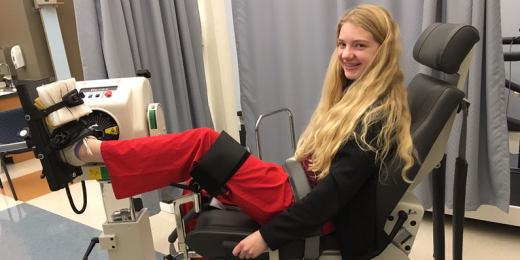Stanford's Mary Leonard has devoted her research career to understanding how chronic diseases weaken children's bones, and what we can do about it.
Latest
Welcome to the new Scope blog!
Stanford Medicine's blog Scope unveiled a new design this week.
A med student’s Christmas wish list
What do medical students want for Christmas? Second-year student Natasha Abadilla reflects on four gifts that top her wish list.
A natural fix for heart valves
In the operating room, cardiac surgeon Joseph Woo, MD, is poised to begin a challenging operation on a man whose aorta and aortic valve have …
What about secondhand marijuana smoke? Stanford Medicine expert weighs in
In 1995, California became the first state in the country to enact laws protecting people from exposure to secondhand cigarette smoke in public spaces. Those …
Too high: Current blood pressure targets may not be low enough
In this fifth, final post in a series on high blood pressure, Randall Stafford, MD, PhD, explains target blood pressure guidelines.
Too high: Side effects hamper many blood pressure medications
In this piece in a series on high blood pressure, Randall Stafford, MD, PhD, tackles the problems caused by the side effects of medications.
Ways to boost blood iron levels while eating a vegan or vegetarian diet
Updated April 18, 2022 If you eat a vegan or vegetarian diet, or if you're just aiming to keep your iron levels up, you probably …
Donor gift leads to innovative cancer clinical trial
When Jeff Schottenstein's wife was diagnosed with gastric cancer in 2014, he immediately jumped into action and left no stone un-turned in researching potential solutions to …
Stanford headache specialist demystifies migraine auras
I have close friends who get debilitating migraines so I knew a bit about auras, which are sensory disturbances that often precede migraine headaches. But experiencing …
To prevent altitude sickness, same-day medication may help
Part of my graduate school orientation took place in California's White Mountains. I'll never forget the ancient bristlecone pines, stunning views, or how sick and …
Mowing down cancer: A podcast featuring Stanford chemist Carolyn Bertozzi
To explain her work, Stanford chemistry professor Carolyn Bertozzi, PhD, often turns to analogies. Cancer cells, she says, are like M&M'S with a hard sugar coating. …
In study, female OB/GYNs less likely than males to receive top patient satisfaction scores
Gender bias can rear its head in unexpected ways. In a new study from Stanford researchers, female OB/GYNs were 47 percent less likely to receive …
On transitions and identity: A reflection by Stanford’s Philip Pizzo
Philip Pizzo, MD, began planning for life after medicine before he had barely begun to work as a doctor. As a resident in pediatrics, Pizzo, …
Taking painkillers with sleeping pills is an increasingly risky business
For those of us following the confounding opioid epidemic, there's more bad news. Stanford researchers have determined that taking strong prescription painkillers together with sleeping …
False advertising? “Natural” cigarettes are bad for nature, Stanford researchers say
A trio of Stanford researchers has published an editorial in Tobacco Control, criticizing the makers of a brand of cigarettes for claiming to be environmentally …













